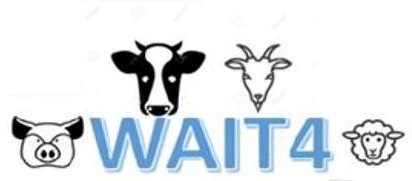Improving animal welfare (AW) is recognized as a key element for the sustainability of livestock production systems. The agroecological (AE) transition will have major impacts on AW with expected positive effects (increased space allowance for animals, more freedoms) but also specific vulnerabilities (less optimized and more diverse feeding regimens, fluctuating environments, emergence of pathogens). The environmental conditions in the coming years will be more variable due to the consequences of the global warming, and will have even wider effects on animals reared in AE systems (less optimized, outdoor conditions). This makes the development of new assessment tools of AW and of decision tools even more useful than at present, in order to adopt AE practices improving AW. Strategies to improve AW are highly dependent on the measurements of traits underlying physiology, behavior and perception of the animal when facing various challenges. The project WAIT4 will exploit new opportunities offered by digital technologies to monitor the different components of AW in real time, and will develop new approaches in artificial intelligence to consider large sets of heterogeneous data collected through these equipment on/in/around the animal. The project will 1/ test and develop digital tools and biosensors to assess animal behaviors, physiological constants and emotions. 2/ develop algorithms of artificial intelligence to integrate heterogeneous data from these technologies and to extract the most relevant indicators (proxies) of AW. 3/ provide a real-time monitoring of these proxies in different species (pigs, small and large ruminants) reared indoor or outdoor, in conventional systems (pasture) or in alternative systems (organic), and under different environmental contexts (climate hazards in tropical or metropolitan areas). 4/ identify early (warning) signals to detect AW and health changes. 5/ develop a fruitful dialog between scientists of different skills (from ethology to data science) and the stakeholders to make the outcomes of the project easier to disseminate. For that, the WAIT4 project moves beyond classical approaches for the study of AW to adopt a holistic approach that better accounts for the different components and their interactions. It will also aim detecting not only ill-being to correct it, but also to characterize well-being and refine AE practices to promote it and prevent the degradation of AW and health in AE systems. Appropriate skills in electrochemistry, physiology, ethology, precision livestock farming, data science and data mining will be associated in a consortium of French Research and Education Institutes (INRAE, CEA, INRIA/Univ Rennes 1, INSA), a Living Lab (LIT Ouesterel) and a VSB (AIHERD). The project will increase research-based capacities to quantify and characterize AW in the AE perspective, by providing new data and proxies to better estimate AW at the animal level and for animals in the herd, and for periods varying for days to months and to seasons. It will underpin the design of new farming practices to improve AW, and tools to better anticipate the effects of climate hazards on AW in AE systems. This will ultimately allow new farming practices to be proposed, to refine criteria that can be implemented into evaluation grids for AW, and to propose selection schemes that are adapted to or able to accelerate AE transition for livestock systems.



